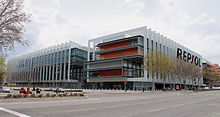Repsol S.A.
 |
|

Headquarters (Madrid, Spain)
|
|
| Sociedad Anónima | |
| Traded as |
BMAD: REP : REP OTCQX: |
| Industry | Oil and gas |
| Predecessor | Instituto Nacional de Hidrocarburos |
| Founded | 1987 |
| Headquarters | Repsol Campus, Madrid, Spain |
|
Area served
|
Worldwide |
|
Key people
|
Antonio Brufau Niubó (Chairman) Josu Jon Imaz San Miguel (CEO) |
| Products | Oil and gas exploration and production, natural gas and LNG trading and transportation, oil refining, petrochemistry |
| Services | Fuel stations |
| Revenue |
|
| €2.571 billion (2013) | |
| Profit | €195 million (2013) |
| Total assets | €65.086 billion (end 2013) |
| Total equity | €27.920 billion (end 2013) |
|
Number of employees
|
24,214 (end 2013) |
| Subsidiaries | Repsol Petróleo, Repsol Butano, Repsol Química, Repsol Exploración, Petronor |
| Website | www |
Repsol S.A. (Spanish pronunciation: [repˈsol]) is an integrated global energy company based in Madrid, Spain. It carries out upstream and downstream activities throughout the entire world. It has more than 24,000 employees worldwide. It is vertically integrated and operates in all areas of the oil and gas industry, including exploration and production, refining, distribution and marketing, petrochemicals, power generation and trading.
Repsol also partners with Honda Racing Corporation to compete in MotoGP under Repsol Honda Team.
In 1927 CAMPSA (Compañía Arrendataria del Monopolio de Petróleos S.A.), headed by Miguel Primo de Rivera y Orbaneja, was created with the objective of administering concessions in handing over the state monopoly of petroleum companies. Originally the company was arranged so that the state would have a minority stake. The Creation of CAMPSA intensified the progress of the Spanish refinery industry.
In 1941 the Spanish government under Francisco Franco created the INI (National Industry Institute), in order to finance and promote Spanish industries. The INI supported CAMPSA in its exploration of Tudanca, Cantabria, a monumental moment in Spanish exploration on the Iberian Peninsula. The year 1947 marked the end of a 20-year contract between the Spanish state and CAMPSA, decentralizing services while at the same time giving specific rights to the state to intervene in the company’s affairs, minus distribution and commercialization, which remained exclusive to CAMPSA.
...
Wikipedia
